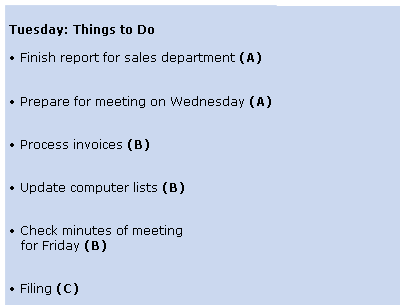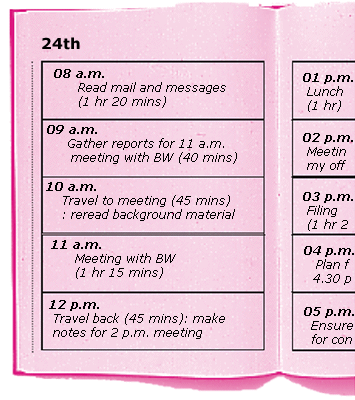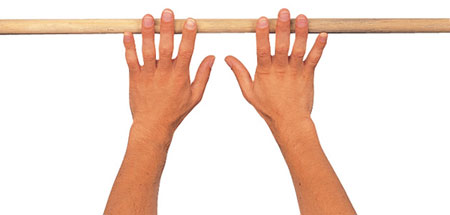One of the major symptoms of stress in the workplace is the feeling
that there are just not enough hours in the day to do everything that needs
doing. This feeling can be reduced by organizing time better with the
implementation of a few simple systems.
Prioritizing objectives
In order to manage your time better, you must begin with an
assessment of your overall objectives in life. What do you want to achieve
– a happy balance of work and family life? Are you actively chasing
promotion in your present job? Will you settle for a position in middle
management, or do you want the chief executive’s office? Once you have decided,
work out your long-term priorities, and plan your workload accordingly.
Planning tasks
Divide your workload into three main categories: A, B, and C.
Consider any tasks that are both urgent and important as A-tasks, important but
slightly less urgent projects as B-tasks, and routine, low-priority jobs as
C-tasks. At the end of each working day, plan out what you need to do the next
day. Intersperse your important A- and B- tasks with C-tasks, such as filing or
background reading, to bring variety into your day and provide relief from the
constant pressures of important tasks.
Points to remember
Objectives and goals change over time. When they do alter, the
priority you give to different tasks must also change.
A task list is not static. A sudden crisis at work or home can
change it and its priorities.
Many meetings are unnecessary.
Indecision wastes time, but a hasty wrong decision will cause
more stress in the long run.
Checking on subordinates in minute detail takes time and will
probably demoralize them.
Telephone interruptions waste time. Tell callers to ring
back.
Allocating time
To make the best use of your time and minimize stress, you need to
manage each day carefully. Look at all the tasks you intend to do, and allocate
a realistic amount of time to each. When possible, schedule one or more
important (category A) tasks in the morning to avoid the pressure of having
them in the back of your mind all day. Set out your schedule using a system
that works well for you – whether a diary, a computer, or a time
planner.
Keeping task lists
Make a list of all the tasks that you have to do. Place them in
order of priority, deciding where they rank according to their urgency and
their importance.

Recording your day
The time you allocate to a certain task or meeting, and the time
you spend actually completing it are not always the same. Mark in your diary
how long each task takes and the duration of each meeting (including time spent
preparing and travelling). Over a period of time, note any habitual
discrepancies and build extra time into future schedules to avoid shunting
tasks forwards, causing them to build up.

Relieving stress during travel time
Many of us spend a lot of time travelling between home and work, and
for meetings. Travelling can be very stressful – frequent flyers are
three times more likely to suffer psychological disorders than most people
– so learn a few simple exercises to help you reduce stress while on the
move.
Increasing flexibility
Place your fingertips on a bar. Push hard, so that the fingers
bend back, then relax. Repeat 10 times.

Strengthening wrists
Grip a bar or the top of your steering wheel, and slowly roll your
hands backwards and forwards. Repeat 10 times.

TIP
Ask a member of your support staff to field calls if you have
urgent work.
TIP
Try to take a five-minute break from your work every hour or
so.
TIP
Cross each job off your “to do” list when the job is
done. It is satisfying to see a list shrink.